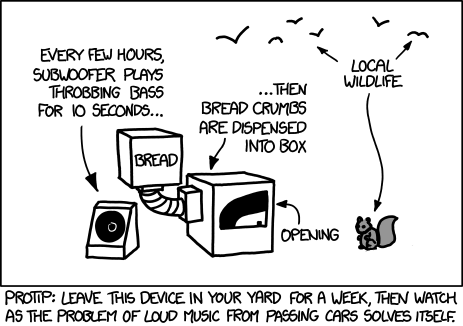Conditioning

'Why are you standing in the yard wearing a papal hat and a robe covered in seeds?' 'Well, the Pope is visiting our town next month ...'

'Why are you standing in the yard wearing a papal hat and a robe covered in seeds?' 'Well, the Pope is visiting our town next month ...'
Herein, the author devises a method of addressing the issue of drivers who turn up their music to irritating levels which usually results in a lot of bass coming from the car — the low frequencies being the ones that most easily penetrate the car and travel farther, thus being more audible to those around the car.
As the title suggests, the idea is to condition animals to respond to a thumping bass. The machine is described as working as follows: every few hours, the bass would turn on, and the box would dispense food behind an opening designed to look like an open car window. Over time, local wildlife would flock to the box to get the food from inside, and would become trained that the sound of a subwoofer means that they can get food by flying through a car window.. Eventually, the animals would respond to any low music, including that played by cars.
The end result would be that the local wildlife would approach, and presumably attempt to enter, any car that has that same thumping bass. Drivers, in turn, would cease to turn up their music in order to prevent the groups of animals from chasing after their cars, thus solving the problem of annoyingly loud bass. This behavior modification can itself be seen as a somewhat different form of conditioning.
The title text is a dialogue about using a similar method of conditioning to send animals after a visiting Pope. Why someone would want that to happen is left to the reader's imagination, although papal visitations usually disrupt the local communities with onerous traffic and special and ostentatious ceremonies, and do attract huge crowds of dignitaries, celebrities, the faithful, the curious, and attending purveyors of foodstuffs and trinkets. Not to mention the impact to the local AirBnB market. Or it could just be Black Hat, who would not need any particular reason for this sort of behavior, and might choose the Pope because of his highly recognizable outfit.
Although these plans may seem far-fetched, a similar scheme was seriously proposed in the United Kingdom during World War I to condition seagulls to associate a submarine's periscope with food, which would give away the locations of enemy submarines as the gulls flocked to their periscopes being raised.
There is also a story about a university student using such conditioning to get birds to disrupt a football game using a strategy similar to the one for the pope in the title text. The student went to the football field every day during summer break dressed as a referee, spreading seeds and blowing his whistle. During the first game at the next semester, the first whistle of the referee summoned a large number of birds looking for the usual seeds, preventing the game from proceeding. According to Snopes, there is no evidence of this ever actually taking place, but it's nearly impossible to disprove.